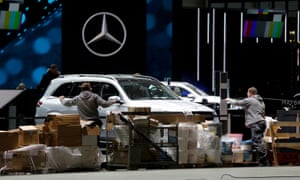In week in which Covid-19 jumped fence into Europe, serious questions emerge over continent’s preparedness
ASpanish football journalist. A pair of young tourists visiting Innsbruck. The parent of a pupil from a primary school in Derbyshire. A young man from Croatia. A businessman and passenger on a train between Frankfurt and Saarbrücken.
All are confirmed or suspected cases of the new coronavirus – Covid-19. What links them is that they contracted the disease while visiting northern Italy.
In a week in which the rapidly spreading global epidemic jumped the fence into Europe, serious questions have emerged over the continent’s preparedness to deal with the disease, as health officials have delayed or struggled to trace initial sources of infection.
By Friday, the first infections had reached the Netherlands, with cases identified in Amsterdam and the southern city of Tilburg, again both people who had recently returned from northern Italy and both unconnected to each other.
With 821 cases in Italy, and an escalating outbreak in France, where 20 new cases were reported overnight, and in Germany, with 60 cases, a new reality had begun to impose itself by the week’s end, as a disease that appeared largely confined to China and Asia extended its grip to Europe’s towns and cities.
And as the spread has accelerated – now confirmed in 57 countries from Nigeria (whose first confirmed infection was a recently returned Italian citizen) to Azerbaijan – the tone of official pronouncements has become notably more anxious, even as stock markets have crashed.
“At the moment in Germany we have almost 60 [cases],” said a spokesman for Germany’s health ministry on Friday. “But it’s a very dynamic situation, as we keep saying.”
The mounting sense of crisis has seen governments struggling to keep up as whole towns have been quarantined in Italy, citizens across Europe have been asked to self-isolate on returning from high-risk areas, and sports events and large public gatherings postponed or restricted.
Amid collapsing air travel and holiday cancellations across Europe, face masks have become a common sight, as headlines and online Q&As from Der Spiegel to Le Monde, and Corriere della Sera to El País, have sought to advise worried readers.
By Friday, it was Switzerland, where the government banned large-scale events including the imminent Geneva car show, which followed the cancellation of the annual Engadin ski marathon, one of the world’s largest cross-country skiing events, which attracts 14,000 participants, the day before.
“In view of the current situation and the spread of the coronavirus, the federal council has categorised the situation in Switzerland as ‘special’ in terms of the Epidemics Act,” the Swiss cabinet announced. “The ban comes into immediate effect and will apply at least until 15 March.”
In multiple cases in recent days, including two cases in the UK, health officials have traced the source of the infection back to Italy where hospital authorities are under investigation for delays in testing so-called “patient one” in the town of Codogno, a 38-year-old “super spreader” identified as “Mattia” who is suspected of contributing to the quick spread of the outbreak.
Complicating the issue is the fact that Italian researchers at the Sacco hospital in Milan appear to have identified two variations of coronavirus, including a local variant that may have circulated for several weeks before the first identified case in northern Italy.
The new coronavirus has found other routes into Europe as well. A case in Denmark has been linked to the burgeoning outbreak in Iran while two of the most recent French cases had both returned from holiday in Egypt.
The situation in France, where 38 cases have been identified, more than double the number on Wednesday, has underlined the difficulties in tracing and managing the new coronavirus once infections have begun to take hold.
Since Tuesday night, when a 60-year-old teacher from the Oise department of northern France died in a Paris hospital – the first local transmission with no links to China or Italy – a dozen other cases have emerged in the area linked to a military airbase in Creil.
Attention has also increasingly focused on Europe’s second busiest airport, Paris Charles de Gaulle, as a potential source of other infections.
All of which has sparked political leaders to warn that the continent is on the brink of an epidemic. On Wednesday, it was the French president, Emmanuel Macron.
Flanked by clinicians as he visited La Pitié-Salpêtrière hospital in Paris, after the first French death, Macron said: “We are facing a crisis, an epidemic that is coming. We know that we’re only at the beginning.”
It was an identical message on Friday in Germany, Europe’s biggest economy, where cases have topped 50, with the health minister, Jens Spahn, declaringthe country was “at the beginning of a coronavirus epidemic”.
In Italy, meanwhile, authorities announced they were planning to reopen schools and museums in some of the areas less hard-hit by the coronavirus outbreak, with even the hardest hit regions Lombardy and Veneto in the north leaning toward opening schools as well.
“The aim is to return to normalcy,’’ the governor of Veneto, Luca Zaia, told state TV in an interview noting that it was an area where tourism was the biggest source of income, bringing in $18bn annually.
https://www.theguardian.com/world/2020/feb/28/an-epidemic-is-coming-europe-struggles-to-contain-coronavirus

